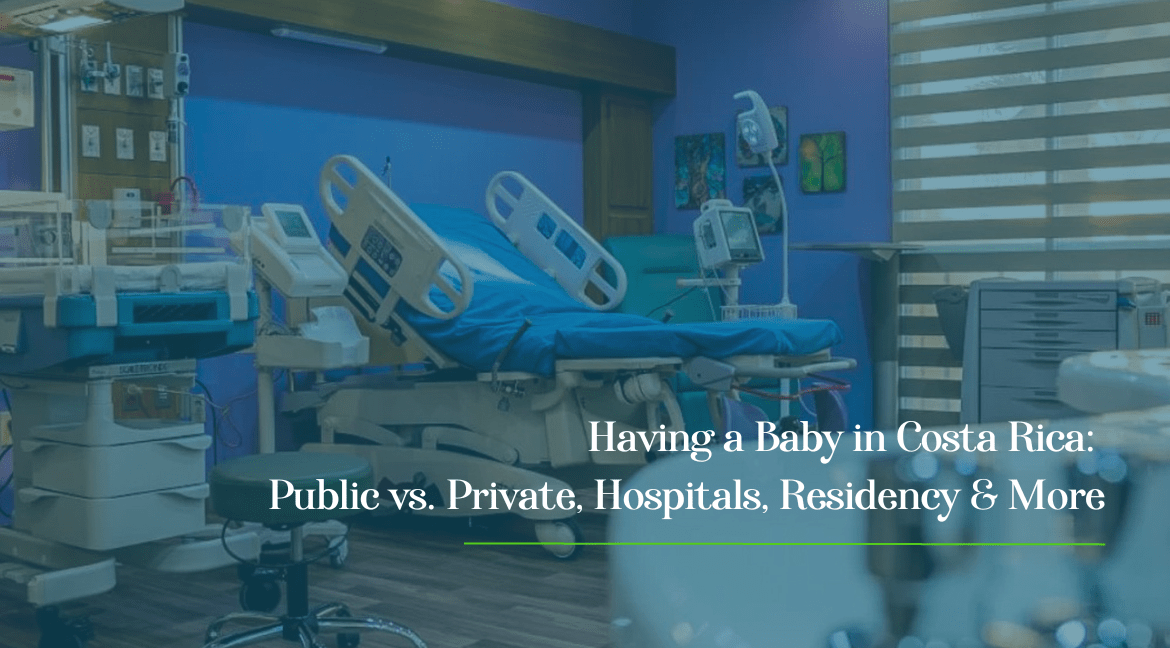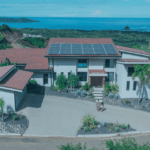Are you considering having a baby in Costa Rica? Then this is a great place to start.
Here at Blue Water Properties, we know quite a bit about both having a baby in Costa Rica and raising kids in Costa Rica. Because many of us have done it ourselves! Many of our clients and friends have done it, too. So, we’ve pooled our collective experiences and knowledge to create a rough footprint for what it’s like to have a baby here.
From choosing public or private healthcare (or a blend of both) to seeking prenatal care, settling on a hospital, making a birth plan, doing your post-natal paperwork, and seeking residency through your now first-degree relationship with a Costa Rica (your baby!), let’s talk about the basics:
Public vs. Private Healthcare

One of the first decisions you’ll make after learning you’ll be having a baby in Costa Rica is whether you’ll do your prenatal care through public, private, or a mixture of public-private doctors.
This is obviously a complex decision based on several factors, including local healthcare availability, your insurance network, and finances. In more rural areas of the country, for example, you may not have ready availability to private obstetricians or private hospitals; conversely, the vast majority of Costa Rica has a nearby, public-care clínica, Ebais, or hospital that will offer prenatal care.
Regarding costs, public prenatal care is free. That is true even if you’re not a resident of Costa Rica, since Costa Rican public healthcare (CCSS) covers a child’s healthcare from conception to age 1, to include a woman’s entire pregnancy and birth. In other words, even if you are not yet a resident and therefore cannot contribute to the CCSS public system, you will be able to access public healthcare for all things pregnancy and birth-related.
If you go private, know that you’re typically looking at $70-$90 per OBGYN visit for standard prenatal care; in Costa Rica, this often includes an ultrasound and ultrasound reading, which you’ll usually have with your doctor (not an ultrasound tech).
The cost of a private hospital birth typically comes in around $4,500-$6,000, depending on your choice of hospital, birth (natural vs. cesarean), and other factors. This cost includes the hospital/OR fee and the doctor’s fee, which comprise the two biggest-ticket items, as well as medicines and other costs related to birth. Note that in the case of emergency care, the NICU, and other unforeseen needs, your cost will go up.
Private insurance will typically cover up to 80% of this cost, after your deductible. Other options, like medical discount plans (ex. Medismart) may reduce those costs by 10-20% or more. For more information on public, private, and discount medical options, please see our full post on Costa Rican healthcare, which goes into more detail on the major differences between public and private options.
Prenatal Care

When having a baby in Costa Rica, your prenatal care will largely depend on whether you go public or private – and, if private, which OBGYN you ultimately choose.
If you go public, you’ll find that prenatal care is very scheduled and somewhat impersonal. Depending on your local clinic, population, and doctors, you may see a different doctor every visit. Your care will be good but likely not very personal, and your care will be restricted to what’s necessary, not what you would want. (For example, you cannot opt-in to a 20-week ultrasound.)
If you go private, you’ll have more latitude in your prenatal decisions and your care will be more personalized. You’ll choose your doctor – and that doctor is whom you’ll see and speak with, every time. You can opt in (or out) of almost every care decision, from not a single ultrasound (unless medically necessary) to ultrasounds at every visit. You can also choose an OBGYN who speaks English.
Labor & Delivery
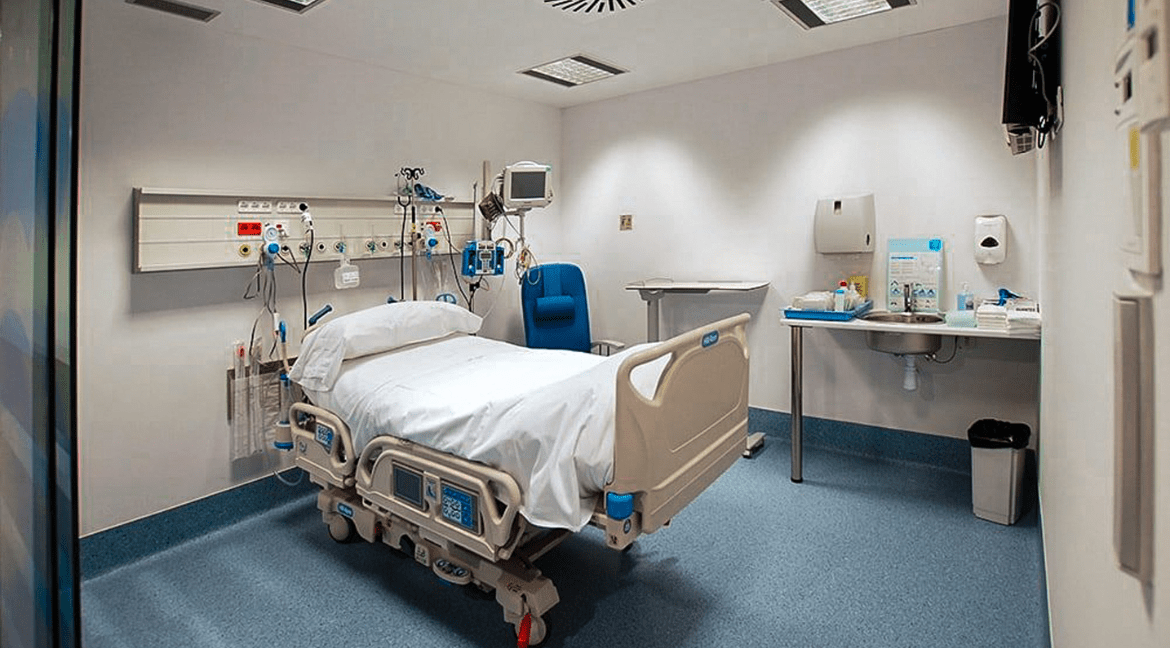
When it comes to labor and delivery, you have a few options.
First, if you’re taking the public route – and, note, you can use private prenatal care and then give birth in a public hospital, if you’d like – then know that you are supposed to go to your closest and/or assigned hospital. For example, if you live Tamarindo, your associated public hospital is in Liberia; if you live in Heredia, you’ll go to the Heredia public hospital. Etc. etc. That said, if you arrive at any public hospital in advanced labor, they will not turn you away.
Know that giving birth in a public hospital can be a challenging experience. That is, giving birth is always a challenge but it can be more so in a Costa Rican public hospital, where processes and procedures are perfunctory, many nurses and doctors do not speak English, and your options are somewhat limited.
For example, you cannot have a water birth in a public hospital. Your prenatal doctor will not attend your birth; you’ll get whichever CCSS OBGYN is on shift during your labor. You’ll be limited to a single birth partner, who until recently, could not attend a C-section (which is only given when medically necessary). You will stay in a labor and post-natal room with other women (there are no private rooms) and your partner can only visit during limited visiting hours.
All these rules have their reasons. Additionally, Costa Rica has been working hard in recent years – say, the last decade+ – to push legislation through for dignified and caring births. That said, depending on where you are from and the type of birth you seek, current policies may not coincide with your birth plan.
If you go to a private hospital, you’ll find that you have much more personalized care and choice in your birth. You will still have to shop around to find a hospital that meets your needs and birth plan preferences; for example, if having a baby in Costa Rica via water birth, only a handful of hospitals are equipped for this type of birth. (And only select OBGYNs will attend one.)
Some of Costa Rica’s most popular private hospitals for having a baby in Costa Rica include:
Once you’ve decided on a hospital, you’ll find that you have much more choice in your birthing options. For example, you can have multiple birth partners with you throughout labor. You can elect an induction or epidural, or opt for a C-section. Your prenatal doctor can likely attend your birth at your chosen hospital. Etc. etc. Bottom line: A private hospital is, hands down, the more comfortable option.
Paperwork, Dual Citizenship & More
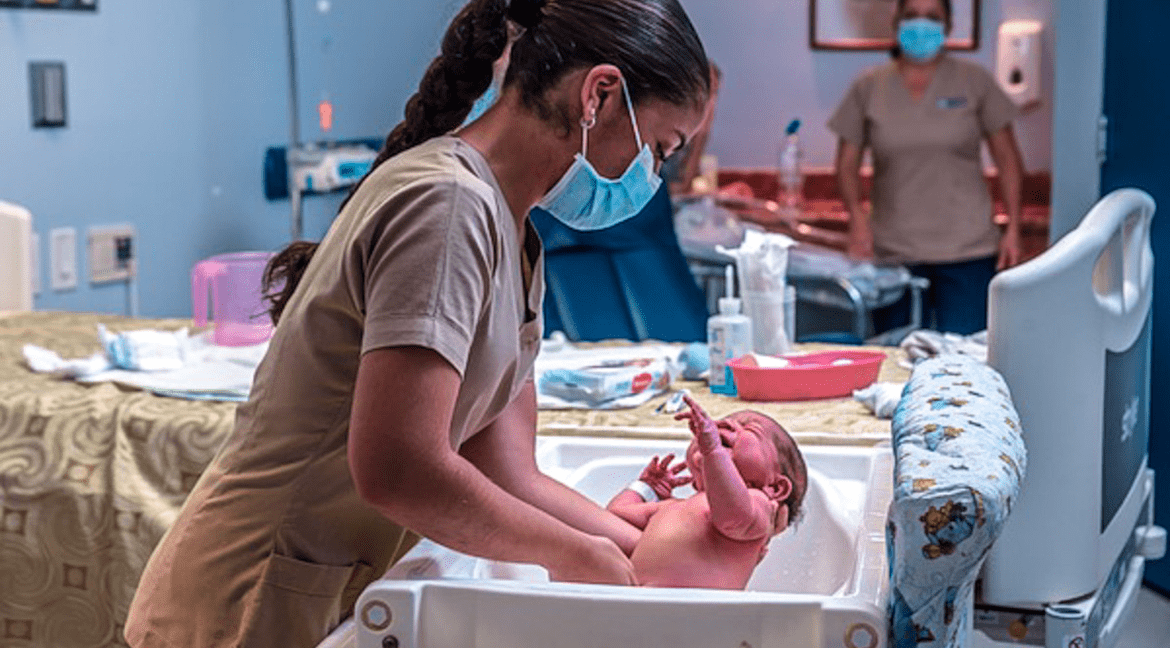
When you give birth in Costa Rica, you’ll likely have a bit of extra paperwork, as in most cases, your child will be a dual citizen (unless your home country precludes this).
All children born in Costa Rica are automatically Costa Rican citizens. While in the hospital, you will fill out the standard naming and identification paperwork; your child will be assigned a Costa Rica cédula number, which will be their lifelong identification number in Costa Rica. It will usually take a few weeks for your baby’s Costa Rican birth certificate to be issued through the Registro Nacional, or National Registry.
Depending on the parents’ country (or countries) of origin, you’ll also need to fill out paperwork for your child’s birth abroad. For example, if you are U.S. citizens, you can apply for a Certificate of Birth Abroad, which will, in turn, grant your child a U.S. Social Security Number (SSN) and U.S. passport; appointments can be made via the U.S. Embassy in San José. The issuance process takes 2-6 weeks, depending on current wait times.
Legal Residency after Having a Baby in Costa Rica
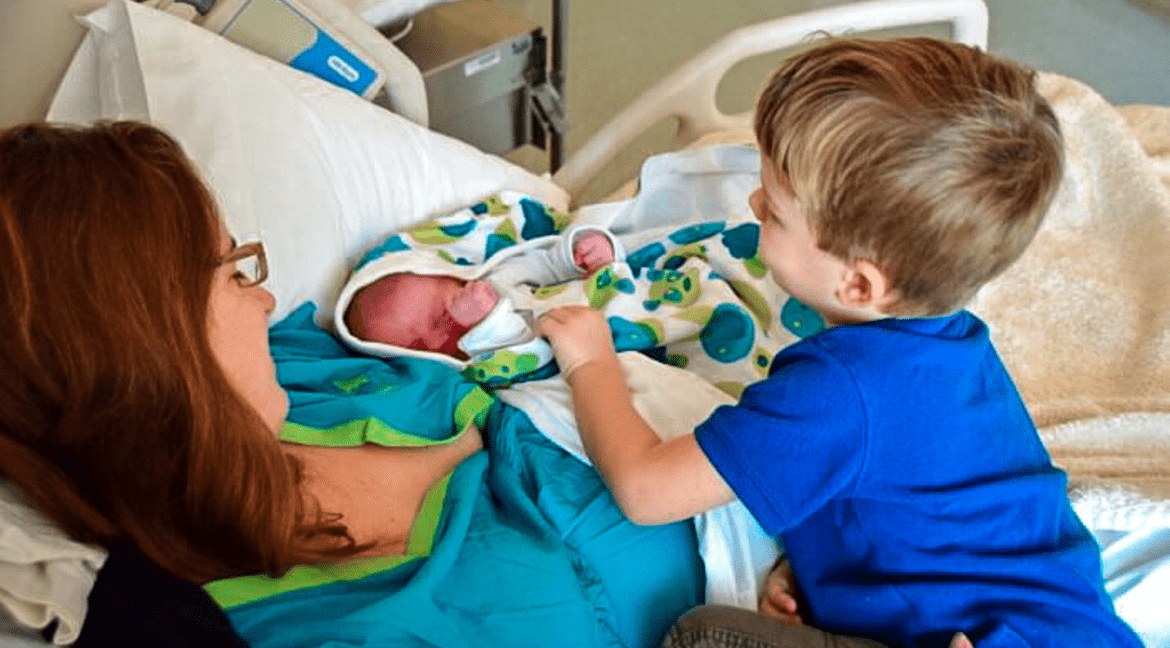
After having a baby in Costa Rica, you can immediately (almost) opt for legal residency. That’s because Costa Rica grants permanent residency to people with a first-degree relationship to a Costa Rica.
Since your baby is a born Costa Rican citizen, as soon as their birth certificate is issued, you and your immediate family (ex. older children) have an direct path to permanent residency. As a permanent resident, you will be eligible to work in Costa Rica. Note that it may take 6-18 months for your residency to be processed, however, as Migración(Immigration) has been running particularly slow since 2020.
Legal residency grants you a slew of benefits, including:
- Legal Right to Reside: You will never run the risk of being turned away at the border. And, if you live here, if you have a home here, or if you’re raising a family here, or if you have made a life here, then that’s important.
- Right to Work: As an immediate permanent resident, you’ll be able to work anywhere in Costa Rica, including in your own business, at a multinational, or at a local business. You’ll have no restrictions.
- Costa Rican Driver’s License: The process of certifying your home driver’s license, or the homologación de licencia, is open only to residents.
- CCSS Healthcare: Public healthcare through the Caja (CCSS) is available only to residents (and all children, from conception to age 1, as explained above).
- Ease of Daily Life: As a resident, you’ll have a DIMEX ID card, which will allow you to complete every process a citizen can (except vote). That’s a big deal in Costa /Rica, where there’s quite a bit of bureaucracy to everyday life. Even the seemingly simple things, like opening a bank account, setting up utilities, or buying a cell phone line – they can all be harder, if not impossible, when you’re not a legal resident. Legal residents can also obtain a firma digital, or digital signature, which makes daily life even easier.
We’d recommend discussing the pros/cons and the residency process with an attorney, before making your final decision. Note that, as parents of a Costa Rica, if you choose to proceed with residency, the process is fairly simple (if you speak Spanish); you can choose to apply through your residency attorney or even do it yourself.
Hi, I’m Becky Clower

Hi, I’m Becky Clower, the owner and broker of Blue Water Properties of Costa Rica. This post is near and dear to my heart, as I gave birth and have raised both of my boys in Costa Rica. They’ve now reached their teen years, so we’ve had sufficient time to experience family life here in the tropics. I’m also lucky to count many other local families as friends – to enjoy their friendship and also benefit from their knowledge and experiences, here in Costa Rica.
This post is obviously a rough outline of what’s involved in having a baby in Costa Rica. We’ve drawn on our collective experiences – some personal, some second-hand. Because that’s Costa Rica, in a nutshell: There is no one, singular experience of moving to Costa Rica, giving birth, or even of defining how you’ll raise your family here.
Just like back home, you’ll encounter a wide array of options. And freedom of choice is part of makes the world go round, right?
Questions About Having a Baby in Costa Rica?
If you’ve made it all the way here, then you’re already well on your way: Information and research are a big part of the process!
If you’d like to chat about having a baby in Costa Rica – or, subsequently, raising a family here – then I’m happy to answer any questions and address any concerns. I promise not to sugar-coat the truth or tell you what you want to hear: I’ll be honest, always. I’ll share my personal experience (and draw on my friends’ experiences, too) and advise you in any way I can.
I’d also like to invite you view our YouTube video series, where I answer all of your biggest questions about moving to Costa Rica and life in the tropics.
So please, get in touch via email or give me a call (1-866-670-0258) or Whatsapp (+506-8705-1850). I look forward to getting to know you!
